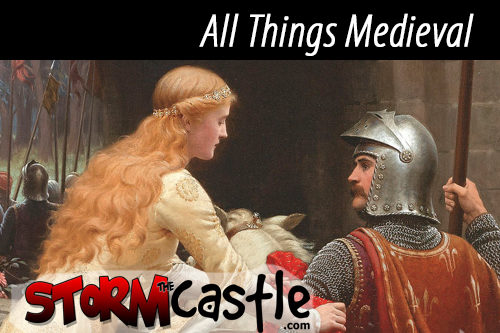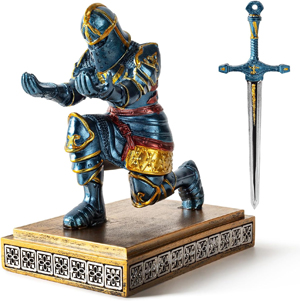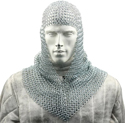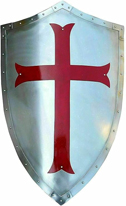
.
This is the medieval section of StormTheCastle.com
- Knights
- Castles
- Games
- Weapons/Armor
- Articles
- Medieval Names
- Medieval Words
- Medieval Terms
- Medieval Jobs
- Medieval Maps
Wills Books
Medieval Knights
His Weapons and Armor
His life depended on these
What was life like for a Medieval Knight? What kinds of things did they do and what kinds of skills and weapons did they have?
The role of the knight changed over the centuries of the Medieval Ages but there are some general roles that held true.
A knight was pledged to serve his liege or king in military service. Generally this pledge was termed that the knight would serve 40 days of each year in military combat for his king. In exchagne the knight would receive loot from battles, his own estate and position in the court
Kneeling knight pen holder affiliate link available on Amazon

Training and becoming a knight
Generally there were two ways for a man to become a knight. He was either born into it or he proved himself worthy of being a knight through bravery and prowess on the battlefield.
For a boy that was born of a knight or of royalty there was a standard process for induction into knighthood. At a young age (usually around 8) the boy was sent to the local lords castle to become a page. There he would learn all of the necessary things of knighthood. This early training would be in the rules of the court, chivalry, music, writing and weapons. After several years of this training he would become a squire where his training would focus more on combat. He would learn use and training in weapons and in particular he would learn the tactics of fighting on horseback. This was one of the most important aspects of becoming a knight. It was the mounted knight that held awe, respect and ability in the medieval world.
Chivalry
When we think of a knight and of chivalry what usually comes to mind is the rescuing of damsels in distress and the protecing of women, children and the poor. But the code of chivalry for a knight was much more complex than this. It revolved around three basic areas: War, Noble standing, and Religion. The War aspect of Chivalry meant that a knight had to be prepared and capable in weapons, horses and military tactics. The Noble standing meant that he was well versed in the arts, music and the manners of the court. And the Religion aspect of chivalry meant that he had to be devoted to his religion and prepared to defend it with his sword. There is a great book devoted to chivalry if you want to learn more about it. Chivalry
A Knights Weapons
The Middle Ages Changed the Sword - This occurred between the 11th and 13th century. The most important change was the addition of the quillion (also known as the cross guard). This quillion protected the wielders hand. The Sword at left shows a very large quillion. Learn more about this particular sword Hand forged Carbon Steel Broad Sword with Leather Wrapped Handle

First and foremost a knight was a warrior sworn to defend his king or liege. This meant that his first priority was in being proficient in the weapons of the times. The first weapon that he mastered was the horse. In any battle a horse was a tactical advantage with its ability to cross large distances quickly and its ability to bring a powerful charge upon an enemy. From his mounted position the knight could wield many weapons.
There are two types of weapons that a knight used: Melee weapons and Polearms.
Melee Weapons are weapons that were used for fighting up close to your opponent. The most common and most widely used of these weapons is the sword. But there were many other types including daggers, knives, warhammers, maces, flails the morningstar and the club.
Polearm Weapons were usually in excess of six feet long and were used in order to keep a distance between yourself and your foe. Good use of a polearm weapon made it difficult for a foe to get up close and use his melee weapon. Polearm weapons were also instrumental when fighting against mounted opponents. These weapons included the Lance, Spear and Halbard.
Read More about Medieval Weapons - Including pictures and explanations of the sword, warhammer, daggers, maces, flails, lances and more.
A Knight's Armor
The middle ages saw many changes in the armor of the knight and this change in armor also affected the weapons of the period. Traditionally we think of a knight as wearing a full suit of metal armor.
Armor came in many variations and styles. Here are some of the major components of a knights armor.
 Barrel Brass Crusader Helm Available on Amazon
Barrel Brass Crusader Helm Available on Amazon
 A Chain Mail Coif - This was worn on the head and under the helmet. It was made of tiny interlocking ringlets. This coif is available through Amazon.com
A Chain Mail Coif - This was worn on the head and under the helmet. It was made of tiny interlocking ringlets. This coif is available through Amazon.com
 A Knights Shield - This was carried by the knight to protect him from the bladed and piercing weapons of enemies. This shield shown here has the design of the Knights Templar Cross.
A Knights Shield - This was carried by the knight to protect him from the bladed and piercing weapons of enemies. This shield shown here has the design of the Knights Templar Cross.
Read More about Medieval Armor:
Medieval Arms and Armor : A Pictorial Archive (Dover Pictorial Archive Series)

